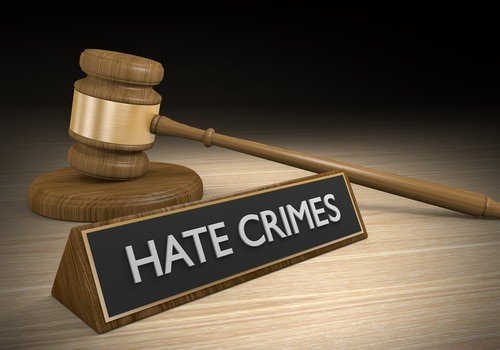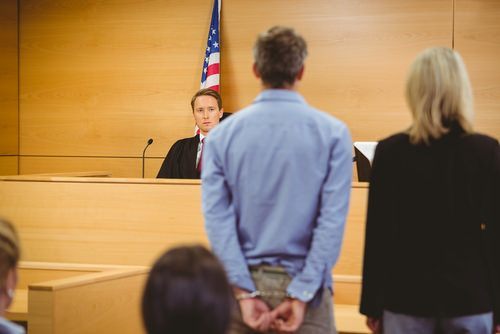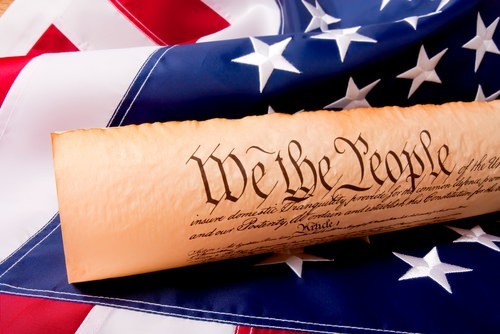Under California hate crimes law, your motivation for committing a crime can matter a lot to your eventual sentence.
This is because California’s hate crime statutes, beginning with Penal Code 422.55 PC, impose severe, additional punishment for harming, threatening or harassing someone because of the person’s
- Disability,
- Gender
- Nationality,
- Race or ethnicity,
- Religion, or
- Sexual orientation.1
California’s hate crimes laws have two major parts.
First, Penal Code 422.6 PC makes it a stand-alone crime to interfere with someone else’s civil rights, or damage or destroy their property, because that person has one of the characteristics in the list above.2
Second, Penal Code 422.7 PC and Penal Code 422.75 PC provide that if
- you commit a crime such as assault or vandalism, and
- you are motivated in part by the fact that the victim has one of the characteristics in the list above,
your criminal offense will be considered a “hate crime” . . . and as a result you may receive an enhanced sentence.3
Note that the victim of a hate crime can also file a civil lawsuit under the Ralph Civil Rights Act or a lawsuit under the Bane Act.
Examples of California hate crimes
Here are several examples of how California’s hate crimes / bias crimes statutes can lead to criminal charges or enhanced criminal penalties:
- A man stands outside a polling place on election day pretending to be a volunteer. When Hispanic voters arrive at the polling place, he gives them incorrect information about where they should go to cast their ballot. The man may be charged under California’s hate crimes laws for interfering with those people’s civil rights based on their ethnicity.
- A woman threatens violence against her neighbors, a homosexual male couple. The woman may be charged under California’s criminal
threats law . . . and she may face several additional years in prison if the prosecutor can prove that she made the threats because of the couple’s sexual orientation. - Several teenagers vandalize a Jewish temple. In addition to being charged with ordinary vandalism, they may face much more severe penalties if they were motivated by bias against the Jewish religion.
- A man who hates the Catholic religion creates a disturbance at a Catholic mass, yelling, screaming and damaging property in the church. (This man could also be charged with the related offense of Penal Code 302 PC disturbing a religious meeting, which is a separate misdemeanor offense.)
Legal defenses
It’s all too common for people to get wrongly accused of hate crimes. There is often a rush to judgment merely because the alleged victim of a crime is from a different ethnic or social group than the defendant.
In particular, it’s very common for prosecutors to try to make a case bigger than it otherwise would be . . . and get a longer sentence for the defendant . . . by trying to argue that s/he committed an ordinary crime because of racial, gender, etc., bias.
If you are accused of a California hate crime, a skilled criminal defense attorney may be able to help you beat…or reduce the severity of…the charges by using certain legal defenses. These might include:
- You didn’t commit a crime (hate crime or not) in the first place . . . and are being charged only because of false accusations, misidentification, etc.
- You did commit a crime, but it was not motivated by bias . . . and thus doesn’t qualify as a hate crime.
- Your conduct qualifies as protected free speech under the U.S. Constitution.
In order to help you better understand California’s hate crimes laws and penalties . . . and how to fight hate crimes charges . . . our California criminal defense attorneys will address the following:
1. The Legal Definition of a “Hate Crime”
in California
1.1. Actual or perceived characteristic
1.2. Crime committed “because of” a protected characteristic
1.3. The underlying crime
2. Penalties for California Hate Crimes
2.1. Penal Code 422.6 PC – stand-alone hate crimes
2.2. Penal Code 422.7 PC – “hate crime” penalties for misdemeanors
2.3. Penal Code 422.75 PC – “hate crime” penalties
for felonies2.3.1. Hate crime sentencing enhancements and other California sentencing enhancements
2.3.2. Hate crime sentencing enhancements and probation/parole
3. Federal Hate Crime Laws
3.1. The Civil Rights Act of 1964 18 USC 245
3.2 The Matthew Shepard and James Byrd Jr. Hate Crimes Prevention Act 18 USC 249
3.3 Conspiracy Against Rights 18 USC 241
3.4 The Civil Rights Act of 1968 a/k/a the Fair Housing Act 42 USC 3631
3.5 Federal sentencing enhancements
4. Legal Defenses Against California Hate Crime Charges
4.1. You aren’t guilty of the underlying crime
4.2. The crime was not motivated by bias
4.3. The conduct qualifies as protected “free speech”
If, after reading this article, you would like more information, we invite you to contact us at Shouse Law Group.
1. The Legal Definition of a “Hate Crime”
in California
The legal definition of a “hate crime” in California is set forth in Penal Code 422.55 PC.4

On the most basic level, a hate crime is a crime that you commit because the victim has . . . or you perceive the victim to have . . . one of the following characteristics:
- Disability,
- Gender (for example, because they are male or female)
- Nationality,
- Race or ethnicity,
- Religion,
- Sexual orientation (for example, because they are gay), or
- An association with a person or group who has one of these characteristics . . . even if the victim doesn’t have that characteristic him/herself.5
1.1. Actual or perceived characteristic
It’s important to note that you can commit a hate crime in California even if it turns out that the victim didn’t have one of the characteristics listed above…as long as you believed (“perceived”) that s/he did.6
Example: Ronald commits an armed robbery against a couple whom he believes to be Jewish. He yells anti-Jewish slurs during the robbery.
It turns out that the couple is not Jewish. However, because Ronald perceived them to be Jewish, he may be charged not only under Penal Code 211 PC California’s robbery law . . . but under California’s hate crimes statute as well.
1.2. Crime committed “because of” a protected characteristic
Under California hate crimes law, you are considered to have committed a crime “because of” the victim’s protected characteristic if you acted either wholly or partially because of it.7
To prove that this is the case, the prosecutor would need to prove that:
- You were biased against the victim because s/he had (or you perceived him/her to have) one of the characteristics listed above, AND
- That bias is what caused you to commit the alleged crime.8
But the bias doesn’t have to be the only factor motivating the alleged crime. If you had more than motivation, you can still face hate crime charges . . . as long as the bias was a substantial part of your motivation.9
Example: Daniel’s wife is raped by several men of Mexican descent. Daniel has often made racist comments about Mexicans even before this and has a white supremacist tattoo. He and several friends round up the Mexican men they believe committed the rape and beat them severely.
Daniel is charged with battery causing serious bodily injury. Because bias against people of Mexican descent was a substantial factor motivating the attack, his crime meets the legal definition of a hate crime in Penal Code 422.55 PC . . . even though it wasn’t the only factor (revenge for his wife’s rape was another).10
1.3. The underlying crime
Of course, you can’t commit a “hate crime” unless you first commit some kind of “crime.” Under the legal definition of a California hate crime, there are two ways to do this.

Penal Code 422.6 PC
First, Penal Code 422.6 PC makes it a crime to do either of the following, in whole or in part because the victim has one of the characteristics we just discussed:
- Willfully injure, intimidate, interfere with or threaten someone in a way that could prevent them from exercising their rights under the laws of California, the California Constitution, federal law, or the U.S. Constitution; OR
- Knowingly damage or destroy someone’s property for the purpose of interfering with their legal and constitutional rights.11
You may suffer criminal penalties under this California hate crimes statute even if the prosecutor can’t prove that you violated any other California criminal law.
Example: Michael is a boss in a factory who, on voting day, gives his white employees time off to go vote…but not his black employees. Furthermore, he tells his black employees that if they are not at work for the entire day on election day, they will lose their jobs.
Michael may be interfering with his black employees’ right to vote . . . a right protected under the U.S. Constitution12 . . . because of their race. Thus, he could be charged with a hate crime under Penal Code 422.6 PC.
It’s important to note, however, that you can’t be charged and convicted of a California hate crime under Penal Code 422.6 PC only based on your speech . . . unless
- the speech threatened violence, and
- you had the apparent ability to carry out the threat.13
Example: Rachel is a petite, frail 75-year-old woman who suffers from dementia. Outside of a Catholic church, she confronts a group of tall young men and tells them how much she hates Catholics. She then threatens to beat them up with her own hands to show how weak Catholics are.
Rachel probably cannot be convicted of hate crime charges under Penal Code 422.6 PC for this incident. Her speech did threaten violence. But she did not have the ability to carry out that threat. And the men she was speaking to probably knew that.
Penal Code 422.7 PC and 422.75 PC
The other ways to commit a “hate crime” are to
- commit a regular California misdemeanor for any of the reasons discussed above (prohibited bias), with the intent to interfere with the alleged victim’s exercise of his/her legal or civil rights, or
- commit a felony for any of the prohibited-bias reasons discussed above.
In this case, you will receive the penalty for the underlying crime…plus certain hate crime sentence enhancements provided for in Penal Code 422.7 and 422.75 PC.14
2. Penalties for California Hate Crimes
2.1. Penal Code 422.6 PC – stand-alone hate crimes
If you violate Penal Code 422.6 PC by interfering with someone’s legal or constitutional rights . . . or damaging or destroying their property . . . because they have one of the protected characteristics listed above . . ., then you will be charged with a California misdemeanor.15
The potential penalties for a hate crime under this statute include:
- Misdemeanor (summary) probation,
- Up to one (1) year in county jail,
- A fine of up to five thousand dollars ($5,000), and/or
- Up to four hundred (400) hours of community service.16
2.2. Penal Code 422.7 PC – “hate crime” penalties for misdemeanors
Unlike the criminal offense just described above under Penal Code 422.6 PC, Penal Code 422.7 PC is simply a penalty . . . specifically, an additional penalty that is imposed whenever you commit a California misdemeanor that is also a hate crime.17
If
- You commit and are convicted of a California misdemeanor,
- The prosecutor proves that this offense meets the legal definition of a hate crime discussed in Section 1 above,
- The prosecutor proves that you committed the hate crime in order to interfere with the alleged victim’s exercise of his/her legal rights, AND
- ONE of the following is true:
a. The misdemeanor either caused an actual physical injury or occurred when you had the present ability to commit a violent injury against the victim,
b. The misdemeanor caused property damage costing more than nine hundred fifty dollars ($950), OR
c. You have been previously convicted of a hate crime under Penal Code 422.6 PC (stand-alone hate crime),
then your misdemeanor hate crime offense will become a wobbler in California law.18 This means that prosecutors may choose to charge it as a felony instead of a misdemeanor.19

As a felony, the potential penalties for the offense might include:
- Felony (formal) probation,
- Sixteen (16) months, two (2) years or three (3) years in prison, and/or
- A fine of up to ten thousand dollars ($10,000).20Example: Trevor, who is black, is charged with the misdemeanor crime of simple California assault for throwing rocks at several white men walking through his neighborhood. The men allege that Trevor shouted racial slurs at them before he threw the rocks.The rocks didn’t hit the men, but the prosecutor alleges that Trevor had the ability to commit a violent injury against the men when he threw them. He also alleges that Trevor threw the rocks because of racial bias. So Trevor’s misdemeanor assault charges become felony hate crime charges under Penal Code 422.7 PC.
But note that this penalty may not be imposed in connection with a misdemeanor conviction under Penal Code 422.6 PC.
In other words, if you commit a misdemeanor stand-alone hate crime as discussed in Section 1.3 above . . . the prosecutor cannot then turn around and elevate those charges to felony charges based on this section of California’s hate crime laws.21
2.3. Penal Code 422.75 PC – “hate crime” penalties for felonies
Penal Code 422.75 PC provides for an enhanced sentence for any crime that is a felony in California law. . . if the prosecutor can prove that that felony was committed as a hate crime.22
Specifically, if the jury decides that a felony you committed qualifies as a hate crime, then you will receive an additional prison sentence of one (1), two (2) or three (3) years in prison.23
And, if you committed a felony hate crime with another person, regardless of whether you
- personally committed the offense, or
- aided and abetted the other person,
the felony hate crime sentencing enhancement increases to an additional two (2), three (3) or four (4) years in prison.24
Example: Jorge waves a gun at an African-American who has just moved into Jorge’s largely Hispanic neighborhood and threatens to shoot him if he doesn’t “watch his step.” His girlfriend Beatriz stands nearby and keeps a lookout for police or other potential trouble.
Jorge is later arrested and charged with a felony violation of California’s criminal threats law. Beatriz is also charged for aiding and abetting him. The prosecutor also asserts that they should face the hate crime felony sentencing enhancement.
If convicted, Jorge and Beatriz could face up to seven years in prison…the three-year maximum sentence for the criminal threats charge,25 plus an additional four years for committing a hate crime with another person.
2.3.1. Hate crime sentencing enhancements and other California sentencing enhancements
Firearms

If you are accused and convicted of committing a felony hate crime . . . and it is alleged that you personally used a firearm to commit the offense . . . that will be an aggravating factor in sentencing. In that case, it is likely that the judge will impose the highest of the three possible terms referred to above (either three extra years, or four extra years in the case of a hate crime committed with another person).26
Also, it is entirely possible for the hate crime sentencing enhancement to be imposed in combination with California’s other major firearms sentencing enhancements.27 These include:
- Penal Code 12022.5 PC California’s sentencing enhancement for personal use of a firearm,28
- Penal Code 12022.53 PC California’s “10-20-life ‘use a gun and you’re done'” law,29 and
- Penal Code 12022.55 PC California’s “drive-by shooting” sentencing enhancement.30
Sentence enhancements for particular crimes
There are also very specific sentencing enhancements for certain offenses that are committed as hate crimes. Two of the most common are:
- Penal Code 190.03 PC . . . which states that a first-degree murder under Penal Code 187(a) PC that is committed as a hate crime is punishable by life in the state prison without the possibility of parole,31 and
- Penal Code 594.3 PC which states that any act of Penal Code 594 PC “vandalism” that is committed as a hate crime directed at a particular religion . . . at a place of worship or a religious educational institution . . . will be prosecuted as a felony rather than a misdemeanor.32
Finally, you will receive an additional one (1)-year prison term for any and every prior conviction you have which also qualifies as a hate crime. However, this final provision only applies if you are NOT simultaneously being sentenced under California’s three strikes law.33
2.3.2. Hate crime sentencing enhancements and probation/parole
If you are sentenced to probation for committing a California hate crime, under Penal Code 422.6 PC or any other California hate crime statute, . . . then the judge will in most cases impose a protective order (also known as a restraining order) as part of the terms of your probation.34
This protective order will require you to refrain from further acts of violence, threats, stalking, or harassment of the victim or victim’s family. Additionally, it may contain appropriate “stay away conditions”…that is, additional requirements that you maintain a certain physical distance from the people named in the order.35
Similarly, California’s parole laws require that …as a condition of parole following a hate crimes sentence …you refrain from further acts of violence, threats, stalking, or harassment of the victim or victim’s family. “Stay away” conditions may also be imposed in this case.36
And…depending on the circumstances…your conditions of probation or parole may include
- participating in a “racial or ethnic sensitivity training” class,
- participating in a year of counseling,
- reimbursing the victim for counseling, and/or
- making payments to a community organization that provides services to hate crime victims.37
3. Federal Hate Crime Laws
In addition to the California hate crime laws we just discussed, there are also laws that punish hate crimes under federal criminal law.
Federal hate crime laws are primarily designed to punish hate crimes in states that do not have their own hate crime legislation. In states like California that have their own hate crime laws, you are more likely to be prosecuted under the state law.
However, if the federal government determines that prosecution by the United States is in the public interest and necessary to secure substantial justice, prosecution under one of the following statutes is possible:
3.1. The Civil Rights Act of 1964, 18 USC 245
In 1964, the United States Congress enacted the federal Civil Rights Act. This law prohibits willingly injuring, intimidating or interfering with another person by force or threat of force…and all attempts to do so…because of the other person’s
- race,
- color,
- religion, or
- national origin,
and because that person was engaged in…or attempting to engage in…a federally protected activity.38 “Federally protected activities” include (but are not limited to)
- enrolling in or attending a public school,
- enjoying any public place,
- applying for employment,
- voting, and
- serving on a jury.39
3.2. The Matthew Shepard and James Byrd Jr. Hate Crimes Prevention Act 18 USC 249
More recently, in 2009, President Obama signed the Matthew Shepard and James Byrd Jr. Hate Crimes Prevention Act (sometimes referred to as the “HCPA” or Matthew Shepard Act) . . . which expands federal hate crime laws in cases of actual or attempted willful bodily injury.

This new federal hate crimes law is more comprehensive in that it:
- no longer requires that the alleged victim be engaging in…or attempting to engage in…a federally protected activity, and
- includes crimes that are motivated by a person’s actual or perceived
- gender,
- sexual orientation, or
- disability.40
3.3 Conspiracy Against Rights 18 USC 241
18 USC 241 makes it a crime for two or more persons conspire to:
- injure,
- oppress,
- threaten, or
- intimidate
any person in the free exercise or enjoyment of any right or privilege secured to him by the Constitution or laws of the United States.41
3.4 The Civil Rights Act of 1968 a/k/a the Fair Housing Act 42 USC 3631
Under Title VIII of the Civil Rights Act of 1968… more commonly known as the “Fair Housing Act”… it is a crime to injure, interfere or intimidate someone… or threaten to do so… in connection with the sale, purchase or rental of property, because of a person’s:
- race,
- color,
- religion,
- sex,
- handicap,
- familial status, or
- national origin.
3.5 Federal sentencing enhancements
Under United States Sentencing Guideline 2H1.1, the base level for offenses involving individual rights… including violations of hate crimes and the fair housing statute… is the greatest of:
-
- 12 sentencing levels for offenses committed by two (2) or more participants (for example, conspiracy);
- 10 sentencing levels for crimes involving:
- the use or threat of force against a person42 , or
- property damage or the threat of property damage; or
- 6 sentencing levels, otherwise.43
And if the sentencing judge determines beyond a reasonable doubt that your crime was motivated by a person’s actual or perceived race, color, religion, national origin, ethnicity, or gender, the sentence will be increased by three (3) sentencing levels, along with any other applicable penalties (e.g., use of a firearm during commission of the crime, etc).44
The judge will then impose a sentence within a range set forth in the Guidelines for the final level, based on your criminal history.
Penalties for violations of federal hate crimes statutes can include:
- a fine in an amount between $5,000 and $250,000, depending on the severity of the crime; and/or
- imprisonment of
- up to one (1) year; or
- if bodily injury results or the crime includes the use, or attempted or threatened use, of a dangerous weapon, explosives, or fire, up to ten (10) years; or
- If death results, or the crimes includes kidnapping or an attempt to kidnap, aggravated sexual abuse or an attempt to commit aggravated sexual abuse, or an attempt to kill, imprisonment for any term of years or for life or, under the Civil Rights Act of 1964 or for a conspiracy against rights, the death penalty.
For a more detailed discussion, please visit our page on Federal and California Hate Crimes Laws: A Comparison.
3. Legal Defenses Against California Hate
Crime Charges
Hate crimes laws are controversial…and rightfully so.
Because of these laws, the same crime is punished more harshly if it is committed because of the victim’s race or religion (for example) than if it is committed merely because the defendant personally dislikes the victim or wants to steal his/her money. To many people . . . including the well-regarded American Civil Liberties Union45 . . . that difference is potentially unfair…and may punish people simply for holding unpopular opinions.

Still, law enforcement agencies invest disproportionate resources in combating these crimes. Many police and prosecuting agencies have their own “hate crimes” divisions so that they can investigate and prosecute these cases with more specialized resources.
Fortunately, there are a number of legal defenses to California hate crimes that a skilled California criminal defense attorney can present on your behalf.
4.1. You aren’t guilty of the underlying crime
As Whittier criminal defense attorney Neil Shouse46 explains:
“The first line of defense is to challenge the underlying conduct. This means that if, for example, you are charged with the California crime of battery as a hate crime, your lawyer should present the most appropriate defenses to the battery charge.”
Legal defenses like
- self –defense / defense of others,
- accident, and/or
- false accusations / mistaken identity
should always be explored as a way to avoid criminal liability altogether.
But when you can’t successfully fight the underlying crime, a couple of the most common defenses to a California hate crime charge include (but are not limited to):
4.2. The crime was not motivated by bias
Just because you have committed a crime against someone whose ethnicity or beliefs are different from yours does not mean you are guilty of a hate crime. A general bias against that group has to be a material reason why you committed the crime.47
The prosecutor will need to have evidence to prove that this was your motivation. If there is any doubt in the jury’s mind that you committed the crime out of dislike for the protected group—as opposed to anger at the individual, sexual or financial motives, etc.—you are not guilty of a California hate crime.
4.3. The conduct qualifies as protected “free speech”
Whether or not your conduct is protected by the “free speech” clause of the First Amendment to the United States Constitution will depend on the exact circumstances of your hate crimes case.

If you conduct consisted exclusively of speech…as opposed to speech in conjunction with an otherwise violent or criminal act…you are not guilty of violating California’s hate crime laws. This is true even if the speech was insulting to someone else’s ethnicity, gender, etc. The only exception is if
- the speech itself threatened violence against a specific individual or group protected under these laws, AND
- you had the apparent ability to carry out the threat.48
Call us for help…

If you or loved one is charged with Penal Code sections 422.55, 422.6, 422.7, and 422.75 PC hate crimes and you are looking to hire an attorney for representation, we invite you to contact us at Shouse Law Group. We can provide a free consultation in office or by phone. We have local offices in Los Angeles, the San Fernando Valley, Pasadena, Long Beach, Orange County, Ventura, San Bernardino, Rancho Cucamonga, Riverside, San Diego, Sacramento, Oakland, San Francisco, San Jose and throughout California.
For more information on Nevada “hate crime” laws, please visit our page on Nevada “hate crime” laws and federal hate crime laws in Nevada.
Legal References:
1 Penal Code 422.55 PC – “Hate crime” defined. (“For purposes of this title, and for purposes of all other state law unless an explicit provision of law or the context clearly requires a different meaning, the following shall apply: (a) “Hate crime” means a criminal act committed, in whole or in part, because of one or more of the following actual or perceived characteristics of the victim: (1) Disability. (2) Gender. (3) Nationality. (4) Race or ethnicity. (5) Religion. (6) Sexual orientation. (7) Association with a person or group with one or more of these actual or perceived characteristics. (b) “Hate crime” includes, but is not limited to, a violation of Section 422.6.”)
2 Penal Code 422.6 PC – Interference with exercise of civil rights because of actual or perceived characteristics of victim; damaging property; punishment; speech; charging and punishment for conduct violating multiple provisions of law [Hate crime as a stand-alone crime]. (“(a) No person, whether or not acting under color of law, shall by force or threat of force, willfully injure, intimidate, interfere with, oppress, or threaten any other person in the free exercise or enjoyment of any right or privilege secured to him or her by the Constitution or laws of this state or by the Constitution or laws of the United States in whole or in part because of one or more of the actual or perceived characteristics of the victim listed in subdivision (a) of Section 422.55. (b) No person, whether or not acting under color of law, shall knowingly deface, damage, or destroy the real or personal property of any other person for the purpose of intimidating or interfering with the free exercise or enjoyment of any right or privilege secured to the other person by the Constitution or laws of this state or by the Constitution or laws of the United States, in whole or in part because of one or more of the actual or perceived characteristics of the victim listed in subdivision (a) of Section 422.55.”)
3 Penal Code 422.7 PC – Aggravating factors for punishment [misdemeanor hate crime]. (“Except in the case of a person punished under Section 422.6, any hate crime that is not made punishable by imprisonment in the state prison shall be punishable by imprisonment in a county jail not to exceed one year, or by imprisonment pursuant to subdivision (h) of Section 1170, or by a fine not to exceed ten thousand dollars ($10,000), or by both that imprisonment and fine, if the crime is committed against the person or property of another for the purpose of intimidating or interfering with that other person’s free exercise or enjoyment of any right secured to him or her by the Constitution or laws of this state or by the Constitution or laws of the United States under any of the following circumstances, which shall be charged in the accusatory pleading: (a) The crime against the person of another either includes the present ability to commit a violent injury or causes actual physical injury. (b) The crime against property causes damage in excess of nine hundred fifty dollars ($950). (c) The person charged with a crime under this section has been convicted previously of a violation of subdivision (a) or (b) of Section 422.6, or has been convicted previously of a conspiracy to commit a crime described in subdivision (a) or (b) of Section 422.6.”)
See also Penal Code 422.75 PC – Enhanced penalties for hate crimes [felony hate crime]. (“(a) Except in the case of a person punished under Section 422.7, a person who commits a felony that is a hate crime or attempts to commit a felony that is a hate crime, shall receive an additional term of one, two, or three years in the state prison, at the court’s discretion. (b) Except in the case of a person punished under Section 422.7 or subdivision (a) of this section, any person who commits a felony that is a hate crime, or attempts to commit a felony that is a hate crime, and who voluntarily acted in concert with another person, either personally or by aiding and abetting another person, shall receive an additional two, three, or four years in the state prison, at the court’s discretion. (c) For the purpose of imposing an additional term under subdivision (a) or (b), it shall be a factor in aggravation that the defendant personally used a firearm in the commission of the offense. Nothing in this subdivision shall preclude a court from also imposing a sentence enhancement pursuant to Section 12022.5, 12022.53, or 12022.55, or any other law. (d) A person who is punished pursuant to this section also shall receive an additional term of one year in the state prison for each prior felony conviction on charges brought and tried separately in which it was found by the trier of fact or admitted by the defendant that the crime was a hate crime. This additional term shall only apply where a sentence enhancement is not imposed pursuant to Section 667 or 667.5. (e) Any additional term authorized by this section shall not be imposed unless the allegation is charged in the accusatory pleading and admitted by the defendant or found to be true by the trier of fact. (f) Any additional term imposed pursuant to this section shall be in addition to any other punishment provided by law. (g) Notwithstanding any other provision of law, the court may strike any additional term imposed by this section if the court determines that there are mitigating circumstances and states on the record the reasons for striking the additional punishment.”)
4 Penal Code 422.55 PC – “Hate crime” defined, endnote 1, above.
5 Penal Code 422.55 PC – “Hate crime” defined. (“For purposes of this title, and for purposes of all other state law unless an explicit provision of law or the context clearly requires a different meaning, the following shall apply: (a) “Hate crime” means a criminal act committed, in whole or in part, because of one or more of the following actual or perceived characteristics of the victim: (1) Disability. (2) Gender. (3) Nationality. (4) Race or ethnicity. (5) Religion. (6) Sexual orientation. (7) Association with a person or group with one or more of these actual or perceived characteristics. (b) “Hate crime” includes, but is not limited to, a violation of Section 422.6.”)
6 See same.
7 See same.
8 Judicial Council of California Criminal Jury Instructions (“CALCRIM”) 1350 – Hate Crime: Misdemeanor Interference with Civil Rights by Force. (“The defendant acted in whole or in part because of the actual or perceived characteristic[s] of the other person if: 1 The defendant was biased against the other person based on the other person’s actual or perceived (disability[,]/ [or] gender[,]/ [or] nationality[,]/ [or] race or ethnicity[,]/ [or] religion[,]/ [or] sexual orientation[,]/ [or] association with a person or group having (this/one or more of these) actual or perceived characteristic[s]); AND 2 The bias motivation caused the defendant to commit the alleged acts.”)
9 See same. (“If you find that the defendant had more than one reason to commit the alleged acts, the bias described here must have been a substantial motivating factor. A substantial factor is more than a trivial or remote factor. However, it does not need to be the only factor that motivated the conduct.”)
10 Based on the facts of People v. Superior Court (Aishman), (1995) 10 Cal.4th 735.
11 Penal Code 422.6 PC – Hate crime as a stand-alone crime, endnote 2, above.
12 U.S. Const., Amendment XV. (“Section 1. The right of citizens of the United States to vote shall not be denied or abridged by the United States or by any State on account of race, color, or previous condition of servitude.”)
13 Penal Code 422.6 PC – Hate crime as a stand-alone crime. (“(c) . . . However, no person may be convicted of violating subdivision (a) based upon speech alone, except upon a showing that the speech itself threatened violence against a specific person or group of persons and that the defendant had the apparent ability to carry out the threat.”)
14 Penal Code 422.7 PC – Misdemeanor hate crime, endnote 3, above. See also Penal Code 422.75 PC – Felony hate crime, endnote 3, above.
15 Penal Code 422.6 PC – Hate crime as a stand-alone crime. (“(c) Any person convicted of violating subdivision (a) or (b) shall be punished by imprisonment in a county jail not to exceed one year, or by a fine not to exceed five thousand dollars ($5,000), or by both the above imprisonment and fine, and the court shall order the defendant to perform a minimum of community service, not to exceed 400 hours, to be performed over a period not to exceed 350 days, during a time other than his or her hours of employment or school attendance.”)
16 See same, Hate crime as a stand-alone crime.
17 Penal Code 422.7 PC – Misdemeanor hate crime. (“Except in the case of a person punished under Section 422.6, any hate crime that is not made punishable by imprisonment in the state prison shall be punishable by imprisonment in a county jail not to exceed one year, or by imprisonment pursuant to subdivision (h) of Section 1170, or by a fine not to exceed ten thousand dollars ($10,000), or by both that imprisonment and fine, if the crime is committed against the person or property of another for the purpose of intimidating or interfering with that other person’s free exercise or enjoyment of any right secured to him or her by the Constitution or laws of this state or by the Constitution or laws of the United States under any of the following circumstances, which shall be charged in the accusatory pleading: (a) The crime against the person of another either includes the present ability to commit a violent injury or causes actual physical injury. (b) The crime against property causes damage in excess of nine hundred fifty dollars ($950). (c) The person charged with a crime under this section has been convicted previously of a violation of subdivision (a) or (b) of Section 422.6, or has been convicted previously of a conspiracy to commit a crime described in subdivision (a) or (b) of Section 422.6.”)
18 See same, Misdemeanor hate crime.
19 See same, Misdemeanor hate crime.
20 See same, Misdemeanor hate crime.
See also Penal Code 1170(h) PC – Determinate sentencing. (“(h)(1) Except as provided in paragraph (3), a felony [including a misdemeanor hate crime elevated to a felony] punishable pursuant to this subdivision where the term is not specified in the underlying offense shall be punishable by a term of imprisonment in a county jail for 16 months, or two or three years.”)
21 Penal Code 422.7 PC – Misdemeanor hate crime, endnote 17, above.
22 Penal Code 422.75 PC – Felony hate crime. (“(a) Except in the case of a person punished under Section 422.7, a person who commits a felony that is a hate crime or attempts to commit a felony that is a hate crime, shall receive an additional term of one, two, or three years in the state prison, at the court’s discretion. (b) Except in the case of a person punished under Section 422.7 or subdivision (a) of this section, any person who commits a felony that is a hate crime, or attempts to commit a felony that is a hate crime, and who voluntarily acted in concert with another person, either personally or by aiding and abetting another person, shall receive an additional two, three, or four years in the state prison, at the court’s discretion. (c) For the purpose of imposing an additional term under subdivision (a) or (b), it shall be a factor in aggravation that the defendant personally used a firearm in the commission of the offense. Nothing in this subdivision shall preclude a court from also imposing a sentence enhancement pursuant to Section 12022.5, 12022.53, or 12022.55, or any other law. (d) A person who is punished pursuant to this section also shall receive an additional term of one year in the state prison for each prior felony conviction on charges brought and tried separately in which it was found by the trier of fact or admitted by the defendant that the crime was a hate crime. This additional term shall only apply where a sentence enhancement is not imposed pursuant to Section 667 or 667.5. (e) Any additional term authorized by this section shall not be imposed unless the allegation is charged in the accusatory pleading and admitted by the defendant or found to be true by the trier of fact. (f) Any additional term imposed pursuant to this section shall be in addition to any other punishment provided by law. (g) Notwithstanding any other provision of law, the court may strike any additional term imposed by this section if the court determines that there are mitigating circumstances and states on the record the reasons for striking the additional punishment.”)
23 See same, Felony hate crime.
24 See same, Felony hate crime.
25 Penal Code 422 PC – California’s criminal threats law.
See also Penal Code 18 PC – Punishment for felony not otherwise prescribed; alternate sentence to county jail.
26 Penal Code 422.75 PC, Felony hate crime, endnote 22, above.
27 See same, Felony hate crime.
28 Penal Code 12022.5 PC – California’s sentencing enhancement for personal use of a firearm
29 Penal Code 12022.53 PC – California’s 10-20-life “use a gun and you’re done” law
30 Penal Code 12022.55 PC – California’s “drive-by shooting” enhancement [may be imposed in connection with hate crimes sentencing enhancement]. (“Notwithstanding Penal Code Section 12022.5, any person who, with the intent to inflict great bodily injury or death, inflicts great bodily injury, as defined in Section 12022.7, or causes the death of a person, other than an occupant of a motor vehicle, as a result of discharging a firearm from a motor vehicle in the commission of a felony or attempted felony, shall be punished by an additional and consecutive term of imprisonment in the state prison for 5, 6, or 10 years.”)
31 California Penal Code 190.03 PC — Life imprisonment without parole; hate crimes. (“(a) A person who commits first-degree murder that is a hate crime shall be punished by imprisonment in the state prison for life without the possibility of parole. (b) The term authorized by subdivision (a) shall not apply unless the allegation is charged in the accusatory pleading and admitted by the defendant or found true by the trier of fact. The court shall not strike the allegation, except in the interest of justice, in which case the court shall state its reasons in writing for striking the allegation. (c) For the purpose of this section, “hate crime” has the same meaning as in Section 422.55. (d) Nothing in this section shall be construed to prevent punishment instead pursuant to any other provision of law that imposes a greater or more severe punishment.”)
32 California Penal Code 594.3 PC — Vandalism; church, synagogue, mosque, temple, building of religious educational institution or other place of worship; punishment if based on racial or religious prejudice
33 Penal Code 422.75 PC – Felony hate crime, endnote 22, above.
34 Penal Code 422.85 PC—- Protective orders; conditions of probation.
35 See same.
36 Penal Code 3053.4 PC – Hate crimes; conditions of parole. (“In the case of any person who is released from prison on parole or after serving a term of imprisonment for any felony offense committed against the person or property of another individual, private institution, or public agency because of the victim’s actual or perceived race, color, ethnicity, religion, nationality, country of origin, ancestry, disability, gender, or sexual orientation, including, but not limited to, offenses defined in Section 422.6, 422.7, 422.75, 594.3, or 11411, the parole authority, absent compelling circumstances, shall order the defendant as a condition of parole to refrain from further acts of violence, threats, stalking, or harassment of the victim, or known immediate family or domestic partner of the victim, including stay-away conditions when appropriate. In these cases, the parole authority may also order that the defendant be required as a condition of parole to complete a class or program on racial or ethnic sensitivity, or other similar training in the area of civil rights, or a one-year counseling program intended to reduce the tendency toward violent and antisocial behavior if that class, program, or training is available and was developed or authorized by the court or local agencies in cooperation with organizations serving the affected community.”)
37 See same.
38 18 U.S.C. 245 – Federally protected activities
39 See same.
40 18 USC 249 – Hate crime acts. (“(a) In general.–(1) Offenses involving actual or perceived race, color, religion, or national origin.–Whoever, whether or not acting under color of law, willfully causes bodily injury to any person or, through the use of fire, a firearm, a dangerous weapon, or an explosive or incendiary device, attempts to cause bodily injury to any person, because of the actual or perceived race, color, religion, or national origin of any person– (A) shall be imprisoned not more than 10 years, fined in accordance with this title, or both; and (B) shall be imprisoned for any term of years or for life, fined in accordance with this title, or both, if– (i) death results from the offense; or (ii) the offense includes kidnapping or an attempt to kidnap, aggravated sexual abuse or an attempt to commit aggravated sexual abuse, or an attempt to kill. (2) Offenses involving actual or perceived religion, national origin, gender, sexual orientation, gender identity, or disability.– (A) In general.–Whoever, whether or not acting under color of law, in any circumstance described in subparagraph (B) or paragraph (3), willfully causes bodily injury to any person or, through the use of fire, a firearm, a dangerous weapon, or an explosive or incendiary device, attempts to cause bodily injury to any person, because of the actual or perceived religion, national origin, gender, sexual orientation, gender identity, or disability of any person– (i) shall be imprisoned not more than 10 years, fined in accordance with this title, or both; and (ii) shall be imprisoned for any term of years or for life, fined in accordance with this title, or both, if– (I) death results from the offense; or (II) the offense includes kidnapping or an attempt to kidnap, aggravated sexual abuse or an attempt to commit aggravated sexual abuse, or an attempt to kill.”)
41 18 USC 241 provides:
If two or more persons conspire to injure, oppress, threaten, or intimidate any person in any State, Territory, Commonwealth, Possession, or District in the free exercise or enjoyment of any right or privilege secured to him by the Constitution or laws of the United States, or because of his having so exercised the same; or
If two or more persons go in disguise on the highway, or on the premises of another, with intent to prevent or hinder his free exercise or enjoyment of any right or privilege so secured—
They shall be fined under this title or imprisoned not more than ten years, or both; and if death results from the acts committed in violation of this section or if such acts include kidnapping or an attempt to kidnap, aggravated sexual abuse or an attempt to commit aggravated sexual abuse, or an attempt to kill, they shall be fined under this title or imprisoned for any term of years or for life, or both, or may be sentenced to death.
42 Same, comment 3: The burning or defacement of a religious symbol with an intent to intimidate shall be deemed to involve the threat of force against a person for the purposes of subsection (a)(3)(A).
43 Same §2H1.1. Offenses Involving Individual Rights
44 See, e.g., United States Sentencing Commission, Aggravating and Mitigating Role Adjustments Primer. SEO Controls (Optional)
45 See Hate-Crime Laws Face Challenge in Courts – Controversy Centers on the Right of Free Speech, Seattle Times, Apr. 6, 1992.
46 Our Whittier criminal defense attorneys handle all types of California felony and misdemeanor cases, including cases with hate crime sentencing enhancements, and represent clients at courthouses throughout the Los Angeles County and San Bernardino County court systems.
47 See CALCRIM 1350 – Hate Crime: Misdemeanor Interference with Civil Rights by Force, endnote 8, above.
48 Penal Code 422.6 PC – Hate crime as a stand-alone crime, endnote 13, above.
